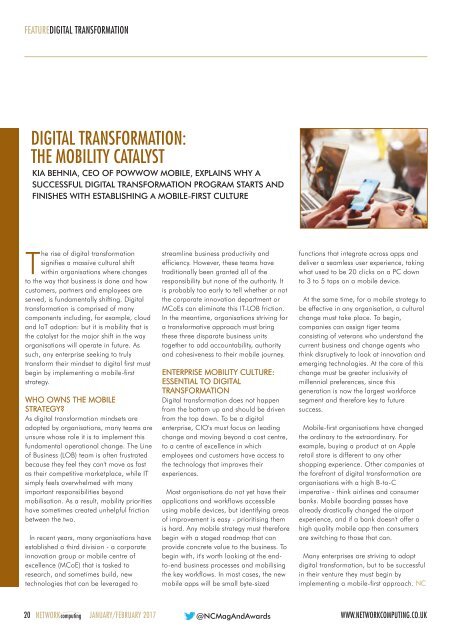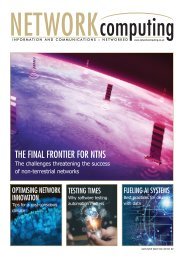NC1701
Create successful ePaper yourself
Turn your PDF publications into a flip-book with our unique Google optimized e-Paper software.
FEATUREDIGITAL TRANSFORMATION<br />
DIGITAL TRANSFORMATION:<br />
THE MOBILITY CATALYST<br />
KIA BEHNIA, CEO OF POWWOW MOBILE, EXPLAINS WHY A<br />
SUCCESSFUL DIGITAL TRANSFORMATION PROGRAM STARTS AND<br />
FINISHES WITH ESTABLISHING A MOBILE-FIRST CULTURE<br />
The rise of digital transformation<br />
signifies a massive cultural shift<br />
within organisations where changes<br />
to the way that business is done and how<br />
customers, partners and employees are<br />
served, is fundamentally shifting. Digital<br />
transformation is comprised of many<br />
components including, for example, cloud<br />
and IoT adoption: but it is mobility that is<br />
the catalyst for the major shift in the way<br />
organisations will operate in future. As<br />
such, any enterprise seeking to truly<br />
transform their mindset to digital first must<br />
begin by implementing a mobile-first<br />
strategy.<br />
WHO OWNS THE MOBILE<br />
STRATEGY?<br />
As digital transformation mindsets are<br />
adopted by organisations, many teams are<br />
unsure whose role it is to implement this<br />
fundamental operational change. The Line<br />
of Business (LOB) team is often frustrated<br />
because they feel they can't move as fast<br />
as their competitive marketplace, while IT<br />
simply feels overwhelmed with many<br />
important responsibilities beyond<br />
mobilisation. As a result, mobility priorities<br />
have sometimes created unhelpful friction<br />
between the two.<br />
In recent years, many organisations have<br />
established a third division - a corporate<br />
innovation group or mobile centre of<br />
excellence (MCoE) that is tasked to<br />
research, and sometimes build, new<br />
technologies that can be leveraged to<br />
streamline business productivity and<br />
efficiency. However, these teams have<br />
traditionally been granted all of the<br />
responsibility but none of the authority. It<br />
is probably too early to tell whether or not<br />
the corporate innovation department or<br />
MCoEs can eliminate this IT-LOB friction.<br />
In the meantime, organisations striving for<br />
a transformative approach must bring<br />
these three disparate business units<br />
together to add accountability, authority<br />
and cohesiveness to their mobile journey.<br />
ENTERPRISE MOBILITY CULTURE:<br />
ESSENTIAL TO DIGITAL<br />
TRANSFORMATION<br />
Digital transformation does not happen<br />
from the bottom up and should be driven<br />
from the top down. To be a digital<br />
enterprise, CIO's must focus on leading<br />
change and moving beyond a cost centre,<br />
to a centre of excellence in which<br />
employees and customers have access to<br />
the technology that improves their<br />
experiences.<br />
Most organisations do not yet have their<br />
applications and workflows accessible<br />
using mobile devices, but identifying areas<br />
of improvement is easy - prioritising them<br />
is hard. Any mobile strategy must therefore<br />
begin with a staged roadmap that can<br />
provide concrete value to the business. To<br />
begin with, it's worth looking at the endto-end<br />
business processes and mobilising<br />
the key workflows. In most cases, the new<br />
mobile apps will be small byte-sized<br />
functions that integrate across apps and<br />
deliver a seamless user experience, taking<br />
what used to be 20 clicks on a PC down<br />
to 3 to 5 taps on a mobile device.<br />
At the same time, for a mobile strategy to<br />
be effective in any organisation, a cultural<br />
change must take place. To begin,<br />
companies can assign tiger teams<br />
consisting of veterans who understand the<br />
current business and change agents who<br />
think disruptively to look at innovation and<br />
emerging technologies. At the core of this<br />
change must be greater inclusivity of<br />
millennial preferences, since this<br />
generation is now the largest workforce<br />
segment and therefore key to future<br />
success.<br />
Mobile-first organisations have changed<br />
the ordinary to the extraordinary. For<br />
example, buying a product at an Apple<br />
retail store is different to any other<br />
shopping experience. Other companies at<br />
the forefront of digital transformation are<br />
organisations with a high B-to-C<br />
imperative - think airlines and consumer<br />
banks. Mobile boarding passes have<br />
already drastically changed the airport<br />
experience, and if a bank doesn't offer a<br />
high quality mobile app then consumers<br />
are switching to those that can.<br />
Many enterprises are striving to adopt<br />
digital transformation, but to be successful<br />
in their venture they must begin by<br />
implementing a mobile-first approach. NC<br />
20 NETWORKcomputing JANUARY/FEBRUARY 2017 @NCMagAndAwards<br />
WWW.NETWORKCOMPUTING.CO.UK

















